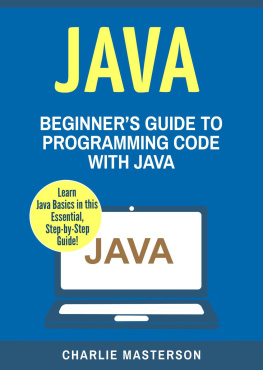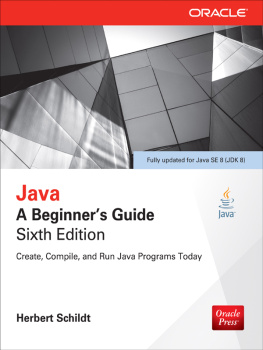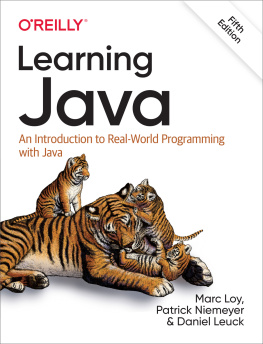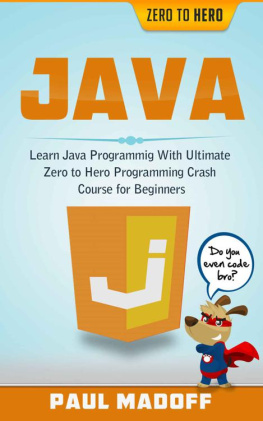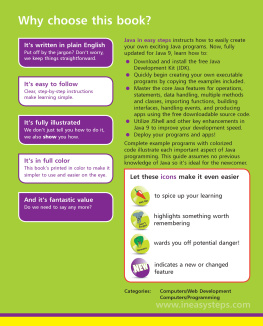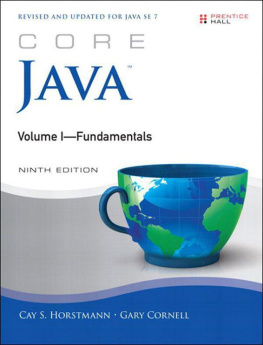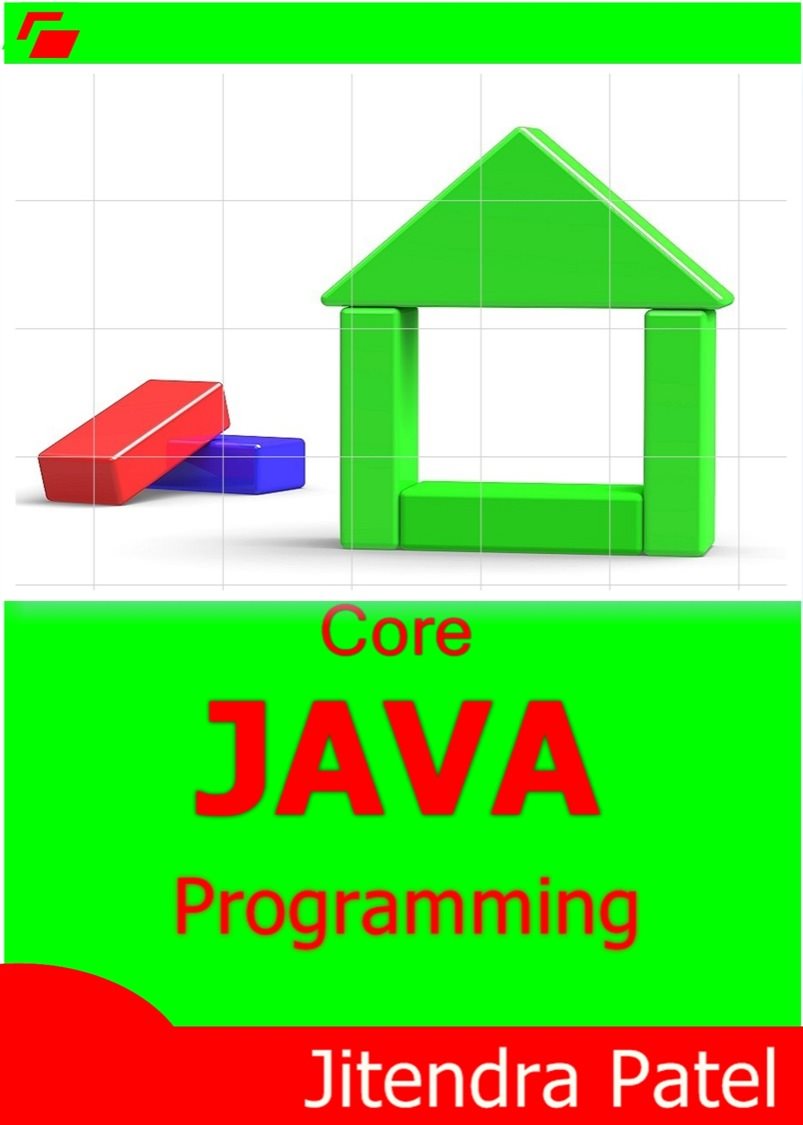
Core Java Programming
By Jitendra Patel Overview Core Java Programming : This book is specially written for beginner Java Students and Programmers to gain fundamentals knowledge about Java programming using easy to use practice examples. This book contains a track for those who are afraid of Java Programming and are confused about how to start Java? Which way to start?
Also every one with interest in Java Programming can refer this book to get the knowledge about Various features the subject.
It covers virtually most of Java and JVM features and some of the advanced features like AWT, Swing, Multithreading, Applets etc... including more than hands on examples tested. Samples are presented in easy to use way through Java Language. Copyright 2012 Jitendra Patel
Core Java Programming
No part of this book shall be reproduced, stored in a retrieval system, or transmitted by any means, electronic, mechanical, photocopying, recording, or otherwise, without written permission from the publisher. No patent liability is assumed with respect to the use of the information contained herein.
Although every precaution has been taken in the preparation of this book, the publisher and author assume no responsibility for errors or omissions. Nor is any liability assumed for damages resulting from the use of the information contained herein.
Warning and Disclaimer Every effort has been made to make this book as complete and as accurate as possible, but no warranty or fitness is implied. The information provided is on an "as is" basis. The authors and the publisher shall have neither liability nor responsibility to any person or entity with respect to any loss or damages arising from the information contained in this book.
Chapter 1 Introduction to JAVA
Java has now emerged as the language of choice due to three reasons. Simplicity, portability and security. Java is true object oriented language.
Javas motto is write once, run anywhere. Many software vendors provide tools for Java (visual development tools or also known as integrated development environment IDE). These tools commonly provide a class browser, a source code editor, and a compiler. Some of the popular Java development tools available as listed below.
| TOOL | VENDOR | PLATFORM |
| Java Workshop | Sun Microsystems | Solaris, 95, NT |
| Java Studio | Sun Microsystems | All Java platforms |
| Java Plan | Lighthouse Design Limited | Solaris, NT |
| Visual Caf for Java | Symantec | 95, 98, NT |
| Visual J++ | Microsoft | 95, 98, NT |
| Visual age for Java | IBM | 95, 98, NT, OS2 |
| Jbuilder | Borland | 95, 98, NT |
| SuperCede | SuperCede | 95, 98, NT |
| JdesignerPro | Bullet Proof | 95, 98, NT, UNIX |
| Super Majo | Penumbra s/w | All java platform |
Javas designer have borrowed the best features of many existing language (like C and C++) and added a few new features to form a simple, easy to learn and object oriented language. It is also a secure language, making it well suited for Internet programming.
Java has two lives, one as a stand-alone computer language for general purpose programming (known as applications) and other as a supporting language for Internet programming (known as applets).
Object Oriented Programming Approach
Object Oriented Paradigm: OOP treats data as critical element in the program development and does not allow it to flow freely around the system. It ties the data more closely to the functions that operate on it and protects it from unintentional modifications by other functions. OOP allows us to decompose a problem into a number of entities called
Objects and then build data and functions (known as
methods in Java) around these entities. The combination of data and objects make up an object. =>Programs are divided into what are known as
Objects. => Data structures are designed such that they characterize the objects. =>Methods that operate on the data are tied together in the data structure. => Data is hidden and can not be accessed by external functions. => Objects may communicate with each other through methods. => New data and methods can be easily added whenever necessary. => Follows
bottom-up approach in program design.
Definition of OOP : OOP is an approach that provides way of modularizing programs by creating partitioned memory area for both data and functions that can be used as templates for creating copies of such modules on demand.
Basic concepts of OOP:
=> Objects and classes => Data abstraction and encapsulation => Inheritance => Polymorphism => Dynamic Binding => Message communication.
Advantages of OOP:
Through inheritance, we can eliminate redundant code and extend the use of existing classes.
Advantages of OOP:
Through inheritance, we can eliminate redundant code and extend the use of existing classes.
The principle of data hiding helps the programmer to build secure programs that can not be attacked by code in other parts of the program. It is possible to have multiple objects to coexist without interference. It is possible to map object in problem domain to those objects in the programs. The data centered approach enable us to capture more details of a model in an implementable form. Object oriented systems can be easily upgraded from small to large systems. Message passing techniques for communicating between objects make the interface descriptions with external systems much simpler.
Software complexity can be easily managed.
Applications of OOP:
Read time systems Simulation and modelling Object oriented database Hypertext, hypermedia and expertext AI and expert systems Neural networks and parallel programming. Decision support and office automation systems CAD/CAM systems
Java Features
Compiled and interpreted A two stage system. First, Java compiler translates source code into
bytecode. Bytecodes are not machine instuctions and therefore, in second stage, Java intepreter generated machine code that can be direclty executed by the machine that is running the Java program.
Platform independent and portable The most significant and important difference between Java and other languages is its portability.
Java programs can be easily move from one computer system to other. Changes and upgrades in OS, processor and system resources will not force any change in Java program. This is the reason why Java has become a popular language for programming on Internet, which interconnects different kinds of systems worldwide. We can download a Java applet from a remote computer onto our local system via Internet and execute it locally. Java ensures portability in two ways. First, Java compiler generates bytecode instructions that can be implemented on any machine.
Secondly, the size of primitive data types are machine-independent. Object-oriented Almost everything in Java is an Object. All program code and data reside within the objects and classes. Java comes with extensive set of classes, arranged in packages, that we can use in our program by inheritance. Robust and secure It provides many safeguards to ensure reliable code. It has strict compile time and run time checking of data.
Java incorporates concept of exception handling which captures series errors and eliminates any risk of crashing system. For programming on Internet security is major issue. Java systems not only verify all memory access but also ensures that no viruses are communicated with an applets. The absence of pointer in Java ensures that programs can not gain access to memory location without prior authorization.
Next page

